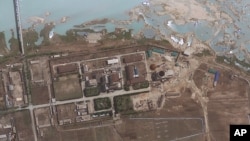Prospects for a new North Korean nuclear agreement have seemingly not improved following the tentative multiparty deal to limit Iran's nuclear program in exchange for lifting sanctions. The agreement with Tehran is similar to past deals with Pyongyang that ultimately failed, and neither the U.S. nor the Koreans seem motivated or interested in trying again.
When asked for South Korea’s reaction to the Iran nuclear agreement and how it might affect the current impasse about North Korea’s nuclear program, Unification Ministry spokesman Lim Byung-chul said Seoul’s position is firm: there is no change in their basic stance that North Korea’s nuclear issue must be solved through a complete and verifiable approach, and in their view multilateral talks such as six-party talks are useful to resolve North Korea’s nuclear issue.
He urged North Korea to immediately return to six-party talks that include the two Koreas, the U.S., China, Japan and Russia. Pyongyang walked out on these negotiations in 2009 after restarting its nuclear program and barring inspections. After North Korea conducted its third nuclear test in 2013, the U.N. Security Council, led by China and the United States, passed severe sanctions on North Korean banking, travel and trade.
But Pyongyang has balked at Washington’s demand that North Korea must first take action to restrict its nuclear weapons program based on the past agreements before any new talks can take place.
Kim Yong-hyun, a professor of North Korean studies at Dongguk University, said the success with Iran could point the way to a new diplomatic effort focusing on North Korea.
He said the agreement can be a "green light" for both the United States and North Korea to actively try to solve the issue.
Iran's nuclear framework is similar to ones entered into with Pyongyang in the past and is a likely blueprint for any future nuclear agreement on the Korean Peninsula.
Iran will agree to restrictions on its nuclear facilities, laboratories, mines and mills, and to allow for inspections from the U.N.'s atomic agency. In return U.S., U.N. and European Union economic sanctions will be suspended.
Professor Kim said the U.S. and its allies can achieve the same results with North Korea if it takes the same less rigid approach.
He said the overall approach to Iran’s nuclear issue, including the reduction of uranium enrichment facilities and the process of resolving Iran’s nuclear issue by June, has been flexible and gradual. While the international community is stern in dealing with North Korea’s nuclear issue, he noted, it has taken a more flexible position with Iran’s nuclear issue.
On the other hand, President Barack Obama is already being criticized by many Republican opponents in the U.S. Congress and in Israel for compromising too much to gain the agreement with Iran.
George Perkovich with the Carnegie Endowment for International Peace said this type of agreement, which provides economic incentives to repressive regimes in exchange for complying with existing international treaties, is politically polarizing and controversial.
“The framework of a negotiation rather than one of a strict compliance frame rewards bad behavior, and that makes it very difficult for people here and elsewhere to support it,” said Perkovich.
Washington’s diplomatic focus will likely remain on finalizing the framework agreement with Iran in the coming months. There is no indication the U.S. is ready change its position on North Korea, especially since past agreements with Pyongyang have fallen apart and repeated missile launches and other provocative incidents continue to escalate tensions in the region.
VOA Seoul Producer Youmi Kim contributed to this report.





